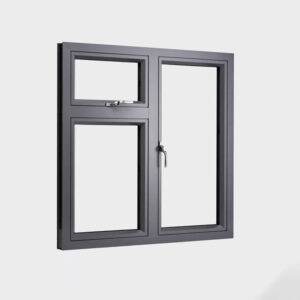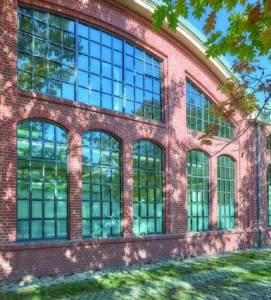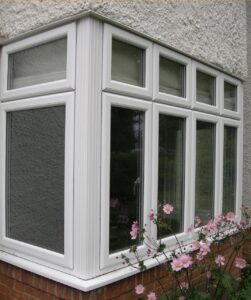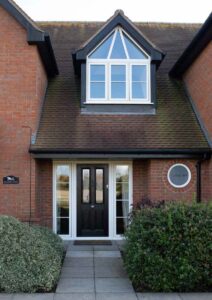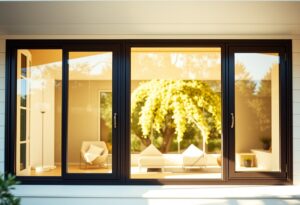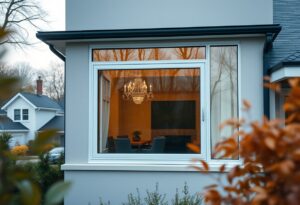Ubiquitous in modern architecture, smart windows are revolutionising the way we interact with our environment. These cutting-edge windows are equipped with advanced technologies that offer a myriad of benefits for both residential and commercial buildings. From energy efficiency to privacy control, high-tech glass windows are transforming the way we think about traditional windows. In this informative blog post, we will explore the features and benefits of smart windows, and how they can enhance the functionality and sustainability of any building.
Key Takeaways:
- Energy Efficiency: Smart windows use high-tech glass that can help reduce energy consumption by controlling the amount of heat and light that enters a building.
- Comfort and Privacy: They offer the ability to adjust transparency, providing privacy when needed while still allowing natural light to enter a space.
- UV Protection: The advanced glass technology in smart windows blocks harmful UV rays, protecting furniture and occupants from potential sun damage.
- Automation: Smart windows can be integrated with building management systems to automatically adjust based on external conditions, saving on heating and cooling costs.
- Enhanced Aesthetics: They provide a modern and sleek look to any building, while also offering the potential for customisable designs and patterns.
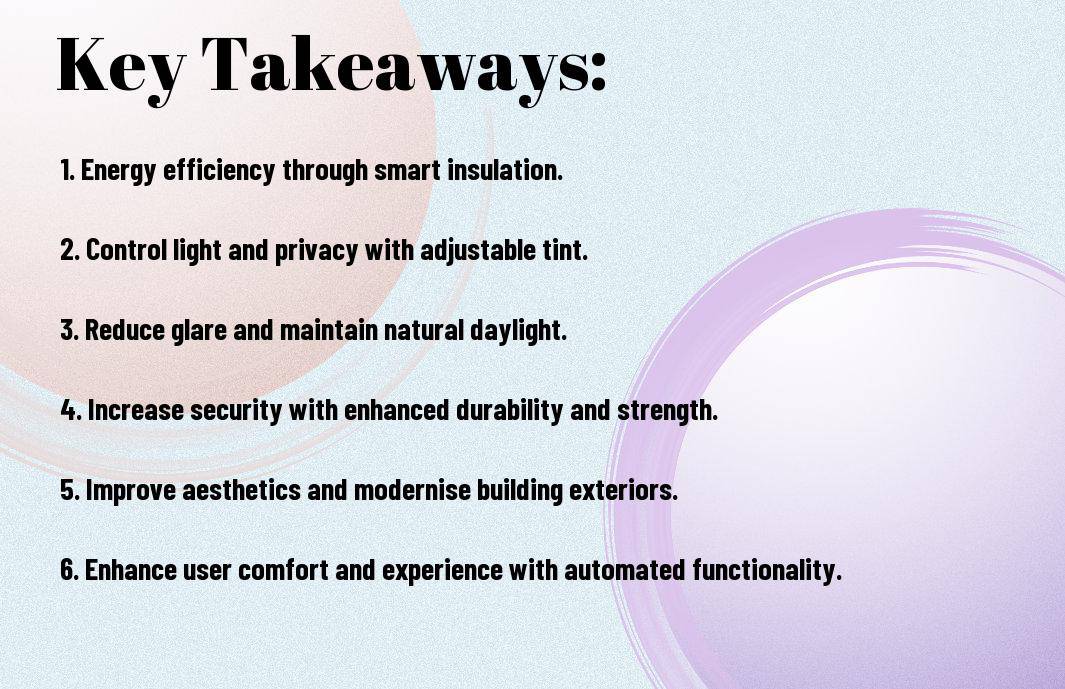
Features of Smart Windows
Smart windows are equipped with advanced technologies that offer a range of benefits for both residential and commercial spaces. Here are some key features that make smart windows a game-changer in the world of glazing.
Electrochromic Technology
One of the most prominent features of smart windows is their use of electrochromic technology. This allows the glass to change its tint or opacity in response to an electrical voltage. By applying a small electric current, the windows can be controlled to let in more or less light, providing a dynamic way to manage natural light and heat entering a building. This not only enhances the comfort of occupants but also reduces the need for artificial lighting and heating, leading to significant energy savings.
Thermochromic and Photochromic Variations
Smart windows also come in thermochromic and photochromic variations, which respond to changes in temperature and UV exposure, respectively. Thermochromic windows automatically adjust their tint based on the ambient temperature, helping to regulate indoor climate and reduce reliance on air conditioning. On the other hand, photochromic windows darken when exposed to UV radiation, shielding interiors from glare and harmful UV rays. These variations offer passive control over solar heat gain and glare, contributing to improved comfort and energy efficiency.
Furthermore, some smart windows combine multiple technologies to achieve a higher level of performance, such as using both electrochromic and thermochromic/photochromic elements to maximise their energy-saving potential while providing a more tailored approach to light and heat management.
Benefits of Using Smart Windows
Smart windows offer a range of benefits that make them a popular choice for modern buildings and homes. From energy efficiency and cost savings to improved comfort and convenience, high-tech glass provides numerous advantages for both residents and building managers.
Energy Efficiency and Cost Savings
High-tech glass windows are designed to reduce solar heat gain and control the amount of natural light entering a building. This helps to minimise the need for artificial heating or cooling, leading to significant energy savings and reduced utility bills. In addition, the ability to adjust the level of tint or opacity of the glass can enhance thermal performance and maintain a comfortable indoor temperature, further lowering energy consumption and improving overall cost efficiency.
Comfort and Convenience
One of the key benefits of smart windows is the impact it has on the comfort and convenience of occupants. By automatically adjusting to changing light conditions, these windows improve visual comfort and reduce glare, creating a more pleasant indoor environment. Furthermore, the ability to control the level of privacy and insulation at the touch of a button or through an automated system adds a convenient and modern touch to any building.
With the ability to achieve optimal comfort and energy efficiency without sacrificing aesthetics, smart windows are an ideal choice for any modern building or home.
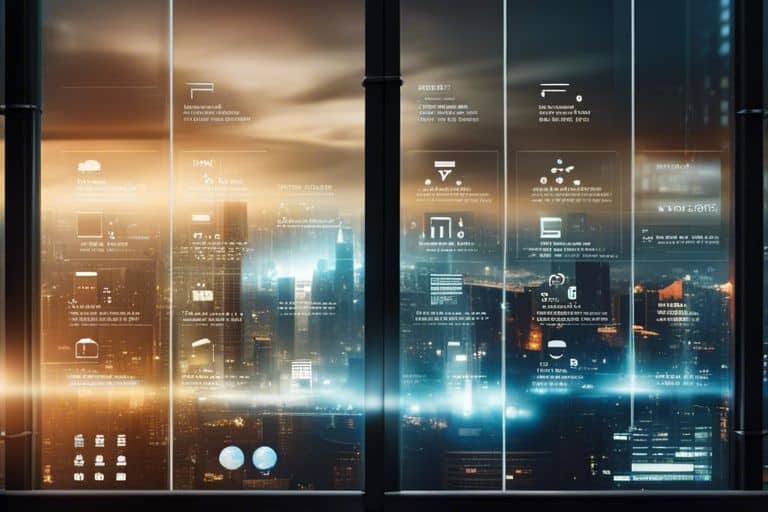
Applications of Smart Windows
Smart windows are a versatile technology with a wide range of applications in different settings, including residential, commercial, and public buildings. They offer a combination of energy efficiency, comfort, and aesthetics that make them an attractive choice for modern architecture and construction. Whether it’s for homes, office buildings, or public facilities, smart windows provide a range of benefits that can enhance the overall experience for occupants and visitors.
Residential Use
Smart windows have gained popularity in residential settings due to their ability to control natural light, provide privacy, and improve energy efficiency. Homeowners can enjoy the benefits of reduced glare, UV protection, and lower heating and cooling costs. With the ability to tint or adjust transparency, smart windows offer a high level of convenience and comfort, making them an ideal choice for modern homes.
Commercial and Public Buildings
Smart windows are also widely used in commercial and public buildings, where they contribute to energy savings, occupant comfort, and sustainability. Offices, hotels, and public institutions can benefit from the adaptive nature of smart windows, which can help reduce the reliance on artificial lighting, regulate indoor temperatures, and create a more pleasant environment for occupants. The ability to dynamically adjust transparency or tinting levels makes smart windows an excellent choice for spaces with varying lighting and privacy needs.
Commercial and public buildings that utilise smart windows not only benefit from the energy efficiency and comfort they provide, but also contribute towards environmentally friendly practices and sustainable building design. This can enhance the overall image and reputation of the organisation, making it an attractive choice for both occupants and visitors.
For more information on smart windows for homes, you can refer to Smart Windows for Homes: Pros, Cons, and More.
The Future of Smart Windows
As technology continues to advance, the future of smart windows looks incredibly promising. With the rapid development of new materials and electronics, the potential for smart windows to revolutionise the way we interact with our homes and buildings is unprecedented.
Technological Advancements
The technological advancements in the field of smart windows have been nothing short of remarkable. From the development of self-tinting glass to the integration of smart sensors, the capabilities of high-tech glass are expanding at an exponential rate. These advancements are not only improving the energy efficiency of buildings but also enhancing the overall comfort and convenience of occupants.
Integrations with Smart Home Systems
Smart windows are increasingly being integrated with smart home systems, allowing for seamless control and automation. This integration enables users to adjust window tint, temperature, and lighting settings with the touch of a button or even through voice commands. The potential for smart windows to work in conjunction with other smart devices, such as thermostats and security systems, opens up a world of possibilities for creating truly efficient and comfortable living spaces.
Integrating smart windows with smart home systems can greatly improve energy efficiency and create a more comfortable living environment. With the ability to control window tint and lighting, users can reduce their reliance on artificial heating and cooling systems, resulting in significant energy savings. Additionally, the integration of smart windows with security systems can provide added peace of mind, as they can automatically adjust tint levels in response to external factors, enhancing privacy and security within the home.
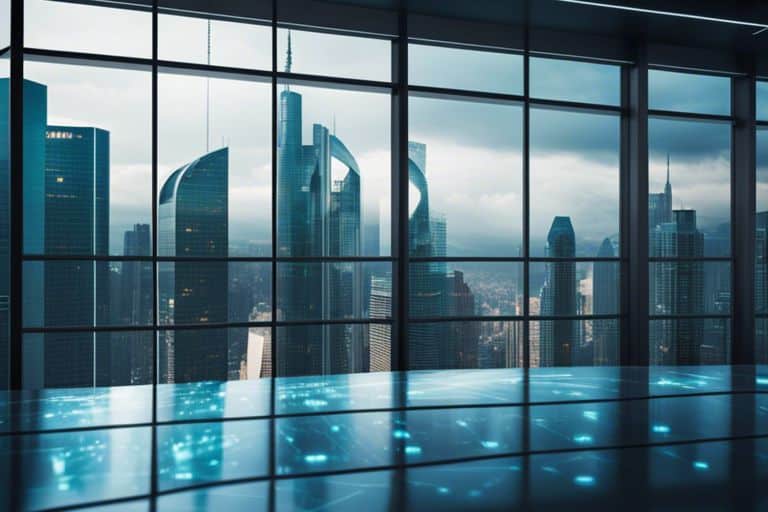
Conclusion: Smart Windows – Features and Benefits of High-Tech Glass
In conclusion, smart windows are a revolutionary technology that offers various features and benefits to homeowners and commercial buildings. The ability to control the amount of light, heat, and glare entering a space, while also providing energy savings, privacy, and convenience, makes smart windows an attractive option for modern buildings. Additionally, the potential for integration with smart home systems and the ability to reduce reliance on artificial lighting and HVAC systems further enhances the appeal of this high-tech glass. As the demand for eco-friendly and energy-efficient solutions continues to grow, smart windows are a valuable investment for those looking to enhance comfort, sustainability, and efficiency in their living and working environments.
FAQ
Q: What are smart windows?
A: Smart windows, also known as high-tech glass, are windows that can change tint or opacity in response to environmental conditions or user input.
Q: What are the features of smart windows?
A: Smart windows come with features such as adjustable tint levels, energy efficiency, UV protection, and privacy control.
Q: How do smart windows work?
A: Smart windows use technologies such as electrochromic, thermochromic, and photochromic to regulate light and heat transmission, allowing users to control their transparency.
Q: What are the benefits of smart windows?
A: The benefits of smart windows include reduced energy costs, improved comfort and productivity, protection from harmful UV rays, and enhanced privacy.
Q: Are smart windows suitable for all types of buildings?
A: Smart windows are suitable for commercial, residential, and industrial buildings, offering versatile solutions for different architectural needs.


